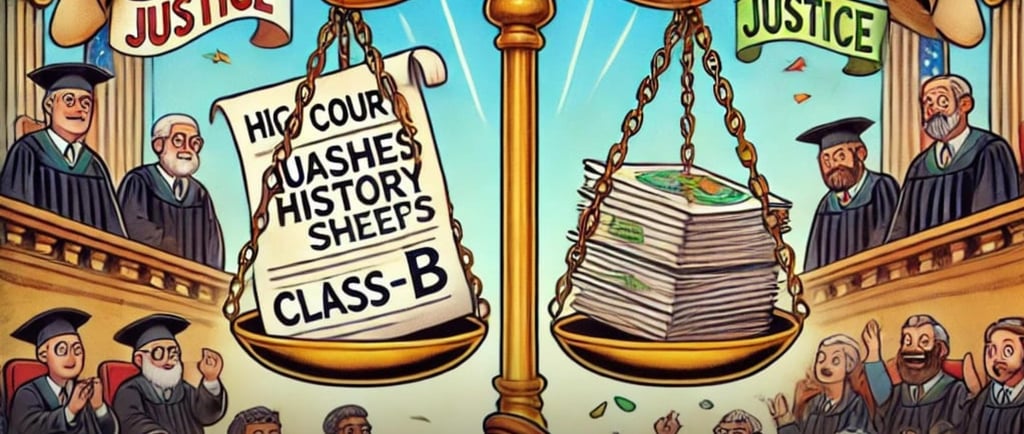High Court Quashes History Sheets Against Petitioners, Calls for Review of Police Regulations
The Allahabad High Court, in a landmark judgment delivered on January 21, 2025, quashed the history sheets opened against four petitioners, including Firoj Malik, Sajid Malik, Imran Malik, and their father, Nizam Malik, by the Deputy Commissioner of Police, Greater Noida, on June 16, 2021. The court also issued directives to the State Government to overhaul the procedure for opening and maintaining history sheets to ensure compliance with constitutional principles and protection of individual liberties.
1/23/20253 min read


Background:
The petitioners challenged the impugned order under which history sheets of Class-B were opened against them, alleging that the process was arbitrary, lacked transparency, and was a violation of their fundamental rights. The court noted that the petitioners, with limited criminal antecedents, were labeled habitual offenders and subjected to police surveillance based on implications in a few cases, some of which stemmed from personal and business rivalries.
The petitioners contended that the history sheets were opened without justification or compliance with the natural justice principles enshrined in Articles 14, 19, and 21 of the Indian Constitution. They argued that the allegations against them, including extortion and violations under the U.P. Gangsters and Anti-Social Activities (Prevention) Act, were politically or personally motivated, lacking concrete evidence.
Court’s Observations:
Justice Siddharth and Justice Subhash Chandra Sharma, presiding over the case, reviewed the police regulations and existing guidelines for opening history sheets. They highlighted the archaic nature of these rules, which date back to colonial times and fail to account for the principles of natural justice in a democratic society.
The court observed that history sheets for Class-A and Class-B offenses serve different purposes. While Class-A pertains to severe crimes like dacoity and burglary, Class-B includes miscellaneous crimes like professional cheating. However, the classification and application of these provisions, especially under Class-B, grant the police excessive discretionary powers without adequate safeguards.
It was noted that while the Director General of Police (DGP), Uttar Pradesh, issued guidelines on November 3, 2022, for reviewing Class-A history sheets, no similar instructions were provided for Class-B. This loophole allows the police to open and maintain history sheets for minor or isolated offenses without oversight or periodic review.
The court criticized the practice of opening history sheets based solely on police reports without providing individuals an opportunity to present their objections. It emphasized that surveillance and police monitoring based on such actions infringe on fundamental rights, including freedom of movement and privacy.
Key Directives:
Quashing of History Sheets: The court annulled the history sheets opened against the petitioners, declaring them unconstitutional and lacking due process. It directed the cessation of surveillance on the petitioners with immediate effect.
Amendment of Regulations: The State Government was instructed to revise the procedures for opening history sheets, mandating a prior opportunity for the affected individuals to submit objections before approval.
Annual Reviews: The court emphasized the need for yearly reviews of history sheets to ensure closure in cases where individuals are acquitted or exonerated, removing undue police surveillance from their lives.
Compliance Reporting: The Principal Secretary (Home) of Uttar Pradesh was ordered to submit a compliance report to the court within three months, outlining steps taken to implement these directives.
Legal Precedents:
The judgment relied on multiple precedents, including Mangi Lal vs. State of M.P. (2004), which underscored the necessity of adhering to principles of natural justice, even in the absence of explicit statutory provisions. It also referred to Munna Lal Gupta vs. State of U.P. (2016), where the court held that unjustified surveillance based on outdated or unverified reports violates fundamental rights.
The court reaffirmed the right to privacy and liberty as integral to the Constitution, asserting that the surveillance of individuals without adequate legal safeguards is a direct infringement of these rights.
Impact:
This decision is expected to have far-reaching implications on the use of history sheets by the police. By mandating reforms and periodic reviews, the judgment aims to curb the misuse of these provisions and ensure that individuals are not subjected to perpetual surveillance without just cause. It also reiterates the judiciary’s commitment to safeguarding constitutional rights against arbitrary state actions.
Conclusion:
The Allahabad High Court’s judgment is a significant step towards reforming police practices and ensuring accountability in the use of history sheets. By striking down arbitrary surveillance measures and calling for procedural safeguards, the court has upheld the principles of justice, equality, and individual freedom. This decision underscores the importance of aligning pre-independence regulations with the constitutional framework of modern India.
Note: The Principal Secretary (Home) has been directed to submit a compliance report to the court within three months, ensuring the implementation of these directives.
